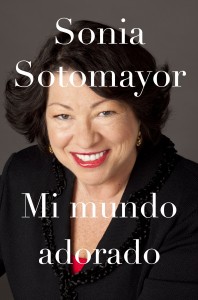Sonia Sotomayor paints a revealing self-portrait
 “It is impossible not to recognize that the vestiges of discrimination take a long time to erase,” writes in Mi mundo adorado (My Beloved World, Vintage, $ 27.95) Sonia Sotomayor, the first Hispanic justice to sit on the United States Supreme Court. In her memoirs, she reveals details of her childhood growing up in a poor neighborhood in the Bronx, as well as the difficulties she faced as a college student at Princeton in an environment rife with prejudice and racism. Just a week after it was published, the book has risen to the top of bestseller’s lists.
“It is impossible not to recognize that the vestiges of discrimination take a long time to erase,” writes in Mi mundo adorado (My Beloved World, Vintage, $ 27.95) Sonia Sotomayor, the first Hispanic justice to sit on the United States Supreme Court. In her memoirs, she reveals details of her childhood growing up in a poor neighborhood in the Bronx, as well as the difficulties she faced as a college student at Princeton in an environment rife with prejudice and racism. Just a week after it was published, the book has risen to the top of bestseller’s lists.
Sotomayor’s book is not the first time a Supreme Court justice opens a literary window into their personal life. Justice Clarence Thomas described his experience with poverty, racism and discrimination in My grandfather’s son, and Sandra Day O’Connor wrote about her childhood in a cattle ranch in Arizona in her memoir Lazy B.
However, in Mi mundo adorado Sotomayor dares to paint a portrait of herself far more revealing than her two predecessors. In her memoirs, she describes her childhood pains, her alcoholic father and a mother who was frequently absent from home. Diagnosed with diabetes, Sotomayor urinated in bed, suffered from fainting and had to learn to give herself insulin shots at the age of nine.
Sotomayor, of Puerto Rican descent, received an advance of more than a million dollars to write this memoir. But Mi mundo adorado does not cover the three years Soto-mayor has served in the Supreme Court or recreates the day in 2009 that she made history by becoming the first Hispanic and third woman to be named one of the nine Supreme Court justices. Instead, it tells the story of her rise from a home where very little English was spoken to her first time as a federal judge in 1992.
What is most striking of her memoirs is the time Sotomayor entered Princeton University as an undergraduate under the Affirmative Action program aimed at balancing the number of minority students at the university. “There were vultures circling, ready to dive when we stumbled” Sotomayor writes, but insists that the controversial program opened doors for Hispanics and African Americans to an education that they did not dare dream about. However, Sotomayor has stated in numerous interviews that her favorite section of the book is chapter seven, where she discovers the deep love her mother had for her father.
Sotomayor has said that she wrote Mi mundo adorado to tell a good story. But her book is so much more: it is lessons on how to rise above adversity and in the process discover yourself.
About the author
Sonia Sotomayor was born in 1954 in New York. She graduated summa cum laude from Princeton University in 1976 and Yale Law School in 1979. She was an assistant district attorney in New York and served as a judge in the Federal Court of the Southern District of New York and the Federal Court of Appeals for the Second Circuit. In 2009 she became and Associate Justice of the U.S. Supreme Court.





